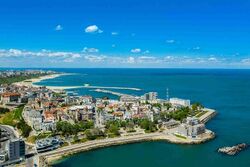Port de Vormoune: Difference between revisions
No edit summary |
No edit summary |
||
| (5 intermediate revisions by one other user not shown) | |||
| Line 5: | Line 5: | ||
| native_name = | | native_name = | ||
| settlement_type = [[Federal cities of Oportia|Federal city]] | | settlement_type = [[Federal cities of Oportia|Federal city]] | ||
| image_skyline = | | image_skyline = Port de Vormoune.jpg | ||
| image_alt = | | image_alt = | ||
| image_caption = Port de Vormoune in {{AN| | | image_caption = Port de Vormoune in {{AN|1708}}. | ||
| image_flag = | | image_flag = | ||
| flag_alt = | | flag_alt = | ||
| Line 33: | Line 33: | ||
| seat = | | seat = | ||
| leader_title = Mayor | | leader_title = Mayor | ||
| leader_name = | | leader_name = Costea Corneanu | ||
| unit_pref = Metric | | unit_pref = Metric | ||
| area_total_km2 = | | area_total_km2 = | ||
| Line 43: | Line 43: | ||
| area_blank1_km2 = | | area_blank1_km2 = | ||
| area_blank2_km2 = | | area_blank2_km2 = | ||
| population_total = | | population_total = 221,688 | ||
| population_as_of = <small> | | population_as_of = <small>[[Censuses of Oportia#1716 census|1716 census]]</small> | ||
| population_density_km2 = auto | | population_density_km2 = auto | ||
| population_demonym = Vormounans | | population_demonym = Vormounans | ||
| Line 51: | Line 51: | ||
}} | }} | ||
'''{{PAGENAME}}''' is a [[Federal cities of Oportia|federal city]] in [[Oportia]]. The city has | '''{{PAGENAME}}''' is a [[Federal cities of Oportia|federal city]] in [[Oportia]]. The city has 221,688 inhabitants according to the [[Censuses of Oportia#1716 census|1716 census]]. | ||
==History== | ==History== | ||
| Line 78: | Line 78: | ||
| align="center"|3 ||align="center"| Libreville ||align="center"| 35,000 | | align="center"|3 ||align="center"| Libreville ||align="center"| 35,000 | ||
|} | |} | ||
==Tourism== | |||
The Urban Development Plan enacted in {{AN|1710|noAN=y}} envisaged city's redevelopment from a military-focused to a regional tourist destination. Military complexes were moved further outside the city center and the lands were repurposed with the construction of parks, spa and wellness centers, hotels, restaurants, bars, nightclubs and other recreational and tourist areas. | |||
The lack of tourist competition in the region made Port de Vormoune quickly succeed, with hundreds of thousands of tourists visiting each year. | |||
Being the birthplace of [[mahla music]], city attracts musical tourists and performers worldwide. | |||
==Notable people== | ==Notable people== | ||
*[[Pedro Coramen]], baron of [[Salòdica Barony|Salòdica]] from {{AN|1678|noAN=y}} to {{AN|1685|noAN=y}}. | *[[Pedro Coramen]], baron of [[Salòdica Barony|Salòdica]] from {{AN|1678|noAN=y}} to {{AN|1685|noAN=y}}. | ||
*[[Gogu Nicolae]], prominent [[mahla music]] artist. | |||
[[Category:Cities]] | [[Category:Cities]] | ||
[[Category:Cities of Oportia]] | |||
Latest revision as of 21:02, 11 March 2024
| Port de Vormoune | |
|---|---|
| Federal city | |
| Port de Vormoune in 1708 AN. | |
| Country | |
| Established | 1678 AN |
| Government | |
| • Mayor | Costea Corneanu |
| Population (1716 census) | |
| • Total | 221,688 |
| Demonym | Vormounans |
| Time zone | CMT+2 |
Port de Vormoune is a federal city in Oportia. The city has 221,688 inhabitants according to the 1716 census.
History
The city was founded in 1678 AN as Porto Vormouna, and was a capital of Caradian barony of Salòdica. It was a part of Projecto Porto, a Caradian plan to create and maintain a small trade port city in order to facilitate the transport of assets and goods.
During the civil war between 1682 and 1685, the city was attacked thrice by the members of Xenoclast. After the final attack and the fall of Caradian state, the nationalists have failed to establish a secure outpost due to the rebellion of the local population, which resulted in a death toll greater than a thousand throughout one year period. By 1686, the city was cleared from the Xenoclast rule, and victory of the locals was proclaimed.
Seeing the infrastructural and economic advancements of the nearest city of Vanie, the locals have established firm connections with the traders and wealthy individuals who were ready to invest in the city.
In 1706, upon Oportia's declaration of independence, the city was granted federal city status as Port de Vormoune.
Subdivisions
Port de Vormoune is divided into 3 arrondissements (districts), which are further divided into quartiers (neighborhoods).
Arrondissements
| No. | Name | Population (1706 est.) |
|---|---|---|
| 1 | Argint Citadel | 90,000 |
| 2 | Port | 45,000 |
| 3 | Libreville | 35,000 |
Tourism
The Urban Development Plan enacted in 1710 envisaged city's redevelopment from a military-focused to a regional tourist destination. Military complexes were moved further outside the city center and the lands were repurposed with the construction of parks, spa and wellness centers, hotels, restaurants, bars, nightclubs and other recreational and tourist areas.
The lack of tourist competition in the region made Port de Vormoune quickly succeed, with hundreds of thousands of tourists visiting each year.
Being the birthplace of mahla music, city attracts musical tourists and performers worldwide.
Notable people
- Pedro Coramen, baron of Salòdica from 1678 to 1685.
- Gogu Nicolae, prominent mahla music artist.
